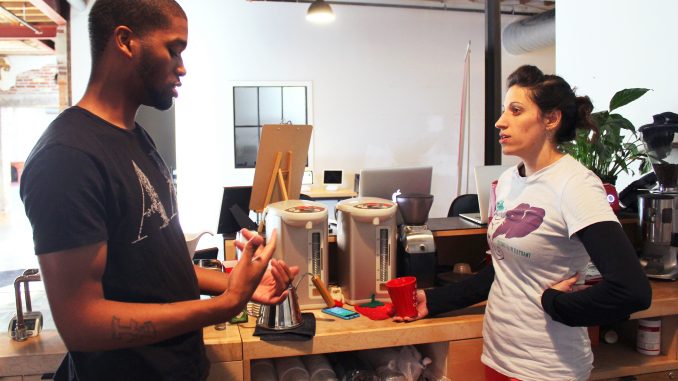
When Lisa Miccolis first saw Ephraim, a Zimbabwean refugee, she said the 16-year-old boy was sitting at a desk writing his life story.
Miccolis formed a strong bond with the foster youth while she was on a three-month photojournalism trip to South Africa in 2008. When Ephraim turned 18, he automatically lost foster support services and refugee status. He was forced to return to Zimbabwe.
“I realized what it means to be turning 18 and not have a support system,” Miccolis said. “I saw a lot of the difficulties he was facing, as well as all the difficulties foster youth face around the world.”
Miccolis maintained contact with Ephraim and returned to Philadelphia, where she built a business centered on providing stability for foster youth. Her coffee shop in Northern Liberties, The Monkey and the Elephant, opened this year and is named after her and Ephraim’s favorite animals.
By employing former foster youth, Miccolis hopes the The Monkey and the Elephant, or M&E, café and mission can ease the city’s foster youths’ rocky transitions into adulthood, she said.
Miccolis said it is often challenging for foster youth to leave support services and achieve self-sufficiency. Nineteen-year-old Naje Taylor, an M&E employee, said the shift has not been easy.
“In foster care, you have to grow up faster than other children,” Taylor said. “[Foster children] face neglection. They face a lack of education because they move around a lot. Some [foster children] isolate themselves.”
“Some have a hard time accepting people because they put up walls,” Taylor added. “Some [foster children] go through abuse, some go through not being fed. I can go on and on.”
According to the Department of Human Services, approximately 3,000 children enter foster care every year in Philadelphia. On average, more than 250 youth age out of the care system annually.
“I knew I couldn’t [open the Monkey and the Elephant] in South Africa, because that’s not where my own support system is,” Miccolis said. “But I know people here, and I knew I could leverage the community that just inherently exists in coffee shops as a support system for people who don’t otherwise have one.”
M&E employees are engaged with a community of supportive adults. An early six-day training program measures former foster youths skill levels and stability.
“We are generally trying to increase their exposures to a variety of things while working on professional and communication skill development,” Miccolis said. “A lot of this happens just by working at the shop through customer interaction.”
Miccolis said she hopes to build both core skills in employees, like communication and critical thinking, in addition to applied skills like money handling and food preparation. Employees complete self-reflection forms, work on “elevator pitches,” Miccolis said, as well as attend career fairs, farmers’ markets and survey public art.
M&E received a grant in April that allowed Miccolis to recruit Taylor and 22-year-old Tyrone Morrison. Morrison was enrolled in DHS care for four years, from age 13 to 17.
Morrison said he had trouble adjusting to his family’s move from West to Northeast Philadelphia when he was 12.
“In West Philly, I was used to a lot of violence and craziness,” Morrison said. “When I came to the northeast, it was this whole different environment. I felt like I had to prove myself. It caused me to make some stupid decisions … caused me to have bad blood with people that could’ve really been beneficial to my life.”
Morrison, who started working at M&E in August, said the program has been constructive.
“Working here has taught me how to hold better conversations, have an interest in wanting to meet new people, and I guess really just accept change,” he said.
Miccolis initially operated M&E as a pop-up shop in several different locations, like Manayunk, and out of Taffets, a bakery located in the Italian Market. M&E is currently nestled in Impact Hub, an artistic community workspace located at 1227 N. 4th St. Miccolis is still fundraising for a more permanent space where she can hire more employees and form a stronger customer base.
“We are still very much in start-up phase,” Miccolis said. “Being able to have a permanent location and open seven days a week, then somebody like Tyrone isn’t going to be juggling two jobs to make ends meet, and we’ll have more time to work together.”
Taylor considers M&E a crucial “stepping stone” in his life.
“When I tell my story, I don’t feel judged anymore,” Taylor said. “Now I can say ‘Listen, I went to school, I got two jobs and I look good.’ Now I say my story at ease. I’m in a place where I can feel important.”
“Some [foster youth] go through it worse than [Tyrone and I] did, but we all have to face our own obstacles,” Taylor added. “I’m doing great things now, and I want to have someone talk about me as a role model later on.”
Morrison said he frequently reflects on his past.
“Everything I did lead me here,” Morrison said. “When I walk around, I’ll see a memorial – one of my homies, Dyia, I just lost him last year. It’s funny because I used to look at him, see his eyes move, shake his hand. Now I’m looking at a cartoon picture at a memorial.”
“I want to tell [foster youth], ‘You are a diamond in the rough,’” he added. “‘Every situation that you’re going through is just you being rubbed off, so when they put you on a table you can shine a little brighter, show your true definition.’”
Claire Sasko can be reached at claire.sasko@temple.edu


Be the first to comment